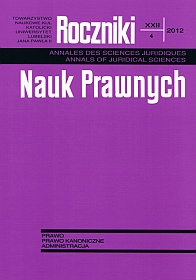The Competence of the Parish Priest to Represent the Parish in Matters Regarding Property Relations in the Ligt of CCL 1983
Abstract
In conclusion, it must be stated, that the parish priest is the only person authorized to represent the parish in matters regarding property matters. His responsibility in representing the parish defines the law and is related to ordinary and extraordinary type of management.
In the event of extraordinary type of management the parish priest acts lawfully in the name of parish, if he previously receives a written mandate from the Ordinary in charge (can. 1281 § 1-2), however in the event of alienation, it is permitted to act lawfully with the permission from the diocesan bishop according to cannon law (can. 1291, 1292, 1295)
Such norms do not have standards which may cause the parish priest consequences related to management performance or invalid legal transactions. In such cases, sanctions can only be made against the administrator (look. can. 1281 § 3). Legal limitations in making legal actions in the form of consent of another parent entity are understandable and are intended to protect church property from unpredictable acts.
Although the parish council finance committee has a role in the management of assets, it cannot influence the effectiveness of legal action undertaken by the parish priest on behalf of the parish. If the parish priest fails to consult the parish council for economic affairs, there may be indication of reckless action and lack of prudence by the parish priest.
In light of these comments it would seem reasonable to state, that the regulation of application of canon law regarding the scope of representation of the estate of the parish priest seems to be consistent. However, the defect would occur through failure to comply with canon law. Thus the postulate would be better education of the clergy, not only in liturgical and pastoral matters, but also in legal matters. Similarly this should be reflected in examinations for parish priests. Up till now sufficient knowledge of canon law and civil law, may guarantee secure legal transactions. This would ensure, that the Church becomes more credible.
Copyright (c) 2012 Roczniki Nauk Prawnych

This work is licensed under a Creative Commons Attribution-NonCommercial-NoDerivatives 4.0 International License.


